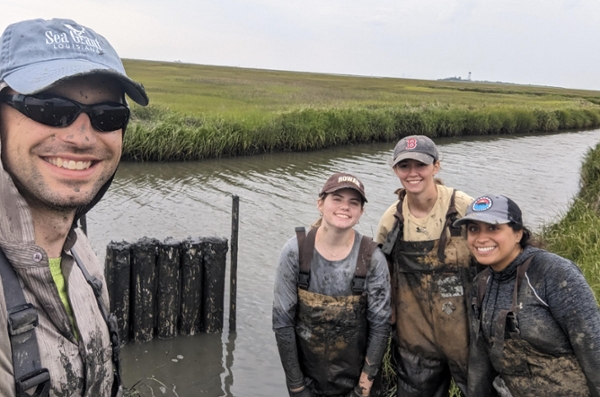Rowan’s Schutte named a National Academies Early Career Research Fellow for salt marsh studies
Rowan’s Schutte named a National Academies Early Career Research Fellow for salt marsh studies

Rowan University Assistant Professor Charles Schutte this fall received a prestigious Early Career Research Fellowship from the National Academies of Sciences, Engineering and Medicine Gulf Research Program.
Schutte received the fellowship for his work studying coastal wetlands and their ability to capture carbon dioxide as well as for his research into the greenhouse gas methane that’s produced by the same marshes.
Schutte, an assistant professor in the Department of Environmental Science within the School of Earth & Environment, focuses his research on wetland preservation and wetland methane production.
The $76,000 award, known as a National Academies Early Career Research Fellowship, supports Schutte’s work studying wetlands preservation, in particular the natural wetlands’ ability to capture and contain carbon dioxide, the leading driver of human-caused climate change.
His current research portfolio includes three projects aimed at measuring and/or restoring New Jersey salt marshes, coastal wetlands that are alternately flooded and drained by rising and falling tides.
They include the:
- Marsh Organ Methane Project, which simulates future changes in marsh elevation, estuary salinity and methane emissions;
- Salt Marsh Drone Project, which will use remote controlled aerial drones to map plant communities and tidal wetland conditions;
- Investigation of leaf compost for salt marsh restoration, which would complement dredge materials used to help offset sea level rise in Garden State marshlands.
Schutte said the National Academies award affirms the importance of the research and provides an unrestricted funding stream to help finance it.
“For me, it’s validating to get feedback from experts in the field who see this work as important and exciting,” he said.
Schutte in January was part of a multi-state research team that landed a $2.9 million National Science Foundation grant to determine if methane produced in saltwater wetlands is increasing or decreasing as a result of climate change and rising sea levels.
A naturally occurring waste product of organisms that live in salt marshes, methane is a greenhouse gas that’s 45 times more potent than carbon dioxide in driving climate change.
“I want to know how the balance between methane emission and carbon burial (in wetlands) will change over time,” Schutte said.
Schutte, who began his career studying carbon capture and methane production in the Gulf region, noted that New Jersey has some 1,200 square kilometers of carbon-capturing coastal wetlands, but it’s endangered.
As a result of a rebound effect from the last ice age, New Jersey is physically sinking as sea level is rising, a one-two punch that scientists expect to exacerbate coastal flooding due to a continued loss of wetlands.
“We’ve already lost half the wetlands in New Jersey, mostly to development, and are due to lose another half in the next century to sea level rise,” he said.